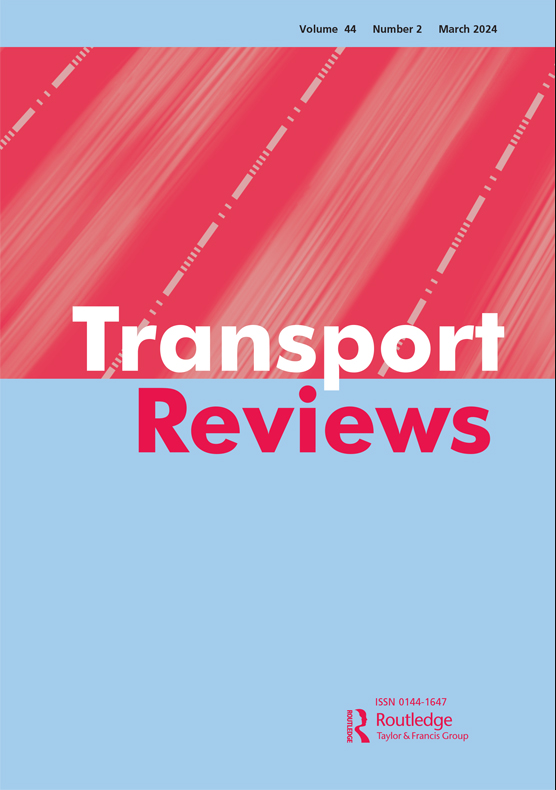Commoning accessibility in (European) peripheries: exploring the practice policy nexus
IF 9.9
1区 工程技术
Q1 TRANSPORTATION
引用次数: 0
Abstract
In many peripheral areas across Europe accessibility is under pressure due to the centralisation and withdrawal of important services and the privatisation and deregulation of public transport. This paper examines how community responses to these accessibility challenges are shaped by policy agendas and conditions. Conceptually, it builds on the notion of “commoning accessibility” (CA), which has recently been coined to account for the various ways in which communities mobilise and organise themselves to (re)claim accessibility as a common good. CA practices include community transport and shared mobility schemes, as well as collective efforts to create and maintain place-based social, cultural and care amenities such as a shops, cafés, neighbourhood centres, or healthcare facilities. This paper further advances the theorisation of “commoning accessibility” by critically situating these practices as part of wider assemblages of governance and changing configurations of the welfare state. To that end, we have conducted a systematic literature review that maps how CA practices are shaped by policy agendas and conditions, thereby focusing explicitly on peri-urban, suburban and rural areas across Europe. Based on our findings we present an analytical framework that distinguishes between commoning as a process and accessibility as an objective. We show that policy shapes both the conditions under which people unite, mobilise and organise themselves, and the way in which accessibility is articulated, translated and pursued as an objective. Moreover, our literature review reveals that these diverse policy factors cannot be reduced to mere legislative changes or administrative and institutional realities but also relate to policymaking as an exercise in agenda-setting. Unravelling this complex relationship between CA practices and policy is an important step towards understanding when and under which circumstances these practices can play a transformative role in meeting accessibility challenges in peripheral areas.
(欧洲)外围地区的共同可及性:探索实践政策联系
在欧洲的许多外围地区,由于重要服务的集中和退出,以及公共交通的私有化和放松管制,可达性受到压力。本文考察了政策议程和条件如何影响社区对这些无障碍挑战的反应。从概念上讲,它建立在“共同可及性”(common accessibility, CA)的概念之上,这个概念最近被创造出来,用来解释社区动员和组织自己(重新)声称可及性是一种共同利益的各种方式。CA的做法包括社区交通和共享移动方案,以及集体努力创建和维护基于地点的社会、文化和护理设施,如商店、咖啡厅、邻里中心或医疗保健设施。本文通过批判性地将这些实践作为更广泛的治理组合和福利国家不断变化的配置的一部分,进一步推进了“共同可及性”的理论。为此,我们进行了系统的文献综述,绘制了CA实践如何受到政策议程和条件的影响,从而明确地关注整个欧洲的城郊、郊区和农村地区。基于我们的发现,我们提出了一个分析框架,区分作为过程的共性和作为目标的可访问性。我们表明,政策既塑造了人们团结、动员和组织自己的条件,也塑造了无障碍作为一项目标被阐明、转化和追求的方式。此外,我们的文献综述表明,这些不同的政策因素不能被简化为仅仅是立法变化或行政和制度现实,而是与政策制定作为议程设置的一种实践有关。解开CA实践和策略之间的复杂关系是理解这些实践在何时以及在何种情况下可以在满足外围地区的可访问性挑战方面发挥变革性作用的重要一步。
本文章由计算机程序翻译,如有差异,请以英文原文为准。
求助全文
约1分钟内获得全文
求助全文
来源期刊

Transport Reviews
TRANSPORTATION-
CiteScore
17.70
自引率
1.00%
发文量
32
期刊介绍:
Transport Reviews is an international journal that comprehensively covers all aspects of transportation. It offers authoritative and current research-based reviews on transportation-related topics, catering to a knowledgeable audience while also being accessible to a wide readership.
Encouraging submissions from diverse disciplinary perspectives such as economics and engineering, as well as various subject areas like social issues and the environment, Transport Reviews welcomes contributions employing different methodological approaches, including modeling, qualitative methods, or mixed-methods. The reviews typically introduce new methodologies, analyses, innovative viewpoints, and original data, although they are not limited to research-based content.
 求助内容:
求助内容: 应助结果提醒方式:
应助结果提醒方式:


